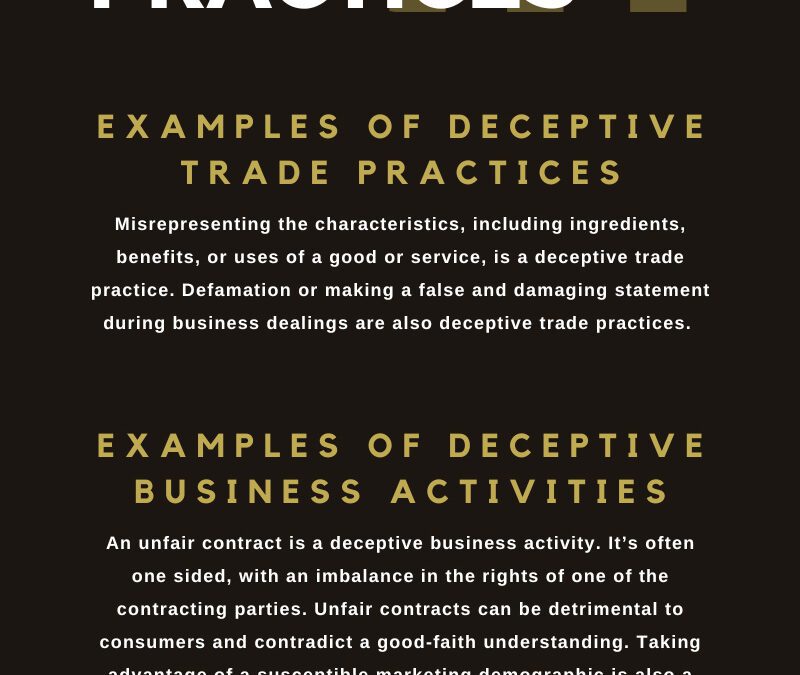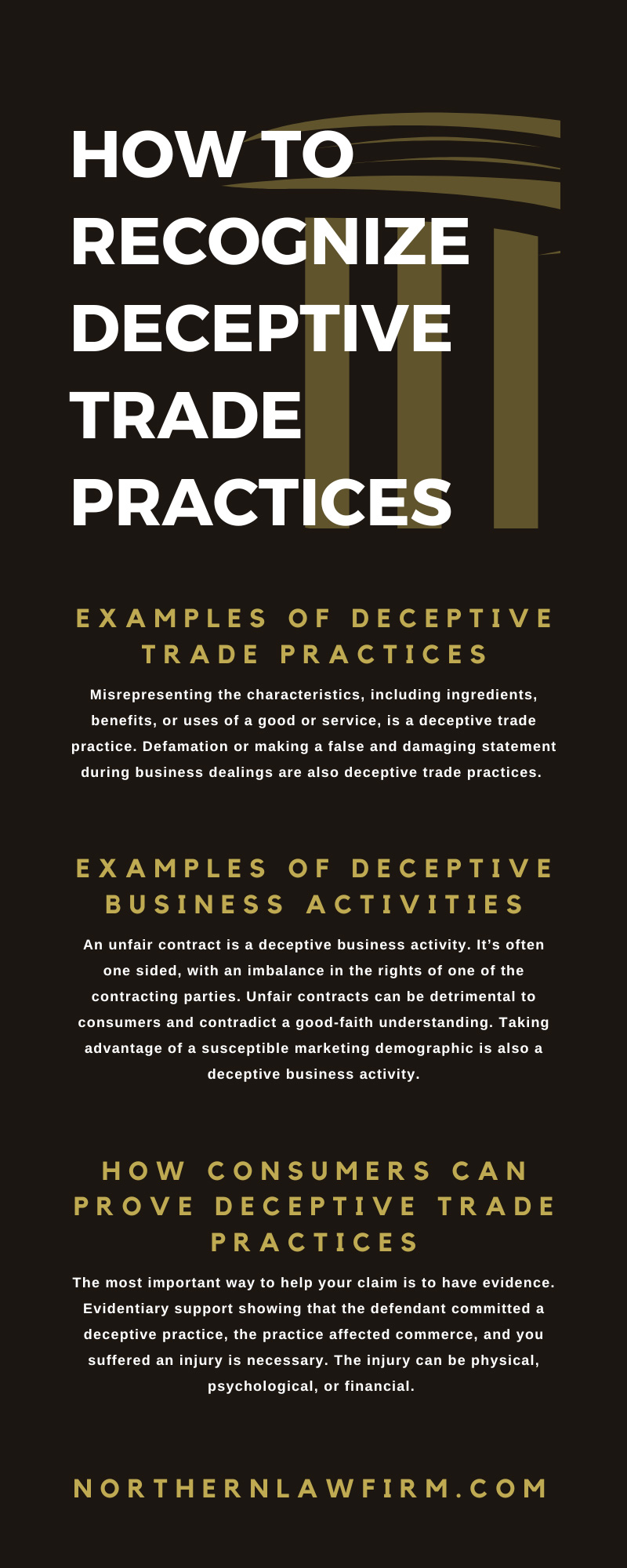Businesses and consumers have rights under federal and state trade laws. One of these rights is protection against deceptive trade practices. Anyone can fall prey to these unfortunate and unlawful practices. To fully understand what trade practices and consumer rights mean, you must know how to recognize deceptive trade practices as a business or individual.
What Are Deceptive Trade Practices?
The legal definition of a deceptive trade practice is any activity that a company or individual performs that has the potential to mislead the public. Deceptive trade practices are similar to and often grouped with unfair trade practices. An unfair trade practice involves the use of deceptive, fraudulent, or unethical methods of obtaining business.
The biggest difference between deceptive and unfair trade practices is that deceptive ones cover the public, even people who aren’t active business consumers. Unfair ones focus more on the consumers who do business or are considering doing business with a specific company or individual. Consumers, in these cases, are often individual people. However, consumers can refer to other businesses as well.
History of the Federal Trade Commission Act
The Federal Trade Commission (FTC) Act outlaws deceptive and unfair trade practices across the US. The government created the FTC in 1914 to prevent unfair commerce competition. In 1938, the FTC Act expanded the role of the FTC to better protect consumers from unfair or deceptive business activities. It’s the only federal agency that protects both consumers and business competitors across the economy.
Who Regulates Trade Practices?
The FTC works on the federal level to regulate trade practices and protect consumers and businesses across the country. However, they don’t work alone. Individual states and districts often have their own localized trade practice regulations. For example, Texans must follow the Deceptive Trade Practices Act (DTPA), which the Attorney General of Texas regulates. The attorney general uses the DTPA to protect consumers and keep businesses in proper legal standing.
Even if a business moves while you’re trying to make a complaint or claim about bad trade practices, the state of Texas can help you find that business. You can also file a complaint at the state or federal level.
Examples of Deceptive Trade Practices
There are many forms of deceptive or unfair trade practices, and we can’t list them all. However, we do want to share a few examples so that you can learn how to recognize deceptive trade practices and protect yourself from them.
Misrepresenting the characteristics, including ingredients, benefits, or uses of a good or service, is a deceptive trade practice. For example, if a food good claims to be vegan but contains meat or animal byproducts, that’s a misrepresentation of ingredients and characteristics. And that misrepresentation is a deceptive trade practice.
Defamation or making a false and damaging statement during business dealings are also deceptive trade practices. For example, your business may be interviewing contractors to find someone to expand your office space. One local contractor may lie about another contractor, telling you that the second contractor cut corners. If your business does not hire the second contractor because of this false and damaging statement, then the first lying contractor is guilty of deceptive trade practices.
Examples of Deceptive Business Activities
While deceptive business practices primarily cover goods and services, they can also cover related business activities. There are many types of deceptive business activities, so we can only offer a few examples. If you have questions or concerns about your or another business’s activities, you should contact a business attorney.
An unfair contract is a deceptive business activity. It’s often one sided, with an imbalance in the rights of one of the contracting parties. Unfair contracts can be detrimental to consumers and contradict a good-faith understanding. For example, most consider it unfair if only one party has the right to cancel the contract.
Taking advantage of a susceptible marketing demographic is also a deceptive business activity. Older people, especially those older than 55, are often a susceptible marketing demographic because they may not understand all the details of a good or service. This means a business can more easily deceive them with a false good or service.
How Consumers Can Prove Deceptive Trade Practices
Many business attorneys can also help businesses or individual consumers who are victims of deceptive trade practices. It can feel overwhelming for your business to go against another or for an individual plaintiff to fight an entire business with a trade practice claim. Business attorneys who understand business law and consumer rights can help with these claims.
The most important way to help your claim is to have evidence. Evidentiary support showing that the defendant committed a deceptive practice, the practice affected commerce, and you suffered an injury is necessary. The injury can be physical, psychological, or financial. For example, the victimized contractor in the example about false and damaging statements would need to show evidence that they suffered financial injury. For instance, they could show how they lost their job because of the deceptive trade practices of the first lying contractor.
How Businesses Can Defend Against False Trade Practice Claims
Businesses and people who are victims of deceptive trade practices should receive justice. However, making a false, deceptive trade practice claim should not be a quick ticket to shutting down a business someone dislikes or getting a large financial settlement. Unfortunately, some businesses and individuals make these false claims anyway.
Business attorneys can help businesses fight these false claims. Just as you would need evidence to prove a claim is true, you will need evidence to prove the claim is false as the defendant. Evidentiary support that proves the truthfulness of the situation and that the deception didn’t occur is crucial. Additional evidence supporting former good faith within business dealings and the community can also help you fight a false claim.
Everyone should know the basics of deceptive trade practices so that they can recognize them and protect themselves against them or false claims. If you need a business attorney to help you in a deceptive trade practices matter, contact Northern Law Firm. Mr. Northern has litigated a wide variety of business matters and can help you.


